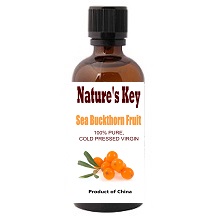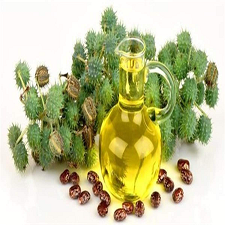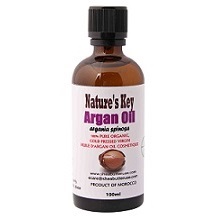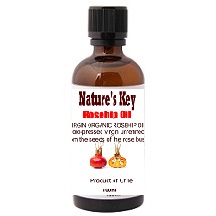Description
Sea Buckthorn Fruit Oil Virgin
What Is Sea Buckthorn Oil?
Contrary to what its name suggests, sea buckthorn oil does not come from the sea. It’s actually derived from sea buckthorn, a shrub that belongs to the Elaeagnaceae family and grows in the mountainous and coastal areas of Asia and Europe.
Its botanical name, Hippophae rhamnoides, means “tree that makes the horse shine,”referring to its ability to improve horses’ health and make their hair shiny and smooth. It was also used to cure blindness in horses.
Sea buckthorn is believed to have originated from the Himalayas, but was also used by the ancient Greeks and other European cultures. It not only appears in ancient Tibetan texts, but is also mentioned in the Indian Materia Medica, early Chinese formularies, and ancient Greek mythology.
Sea buckthorn oil was even cited in the blood-stained histories of Genghis Khan, proving that the benefits and uses of sea buckthorn have been well-known for a very long time.
There are two kinds of sea buckthorn oil: seed oil and fruit oil. They are both derived from the small, nutrient-rich and yellow-orange berries, which are about one-third the size of a blueberry. The seed oil is extracted from the small dark seeds, while the fruit oil comes from the fleshy pulp.
Although they share some characteristics in their nutrient profile, sea buckthorn seed oil and fruit oil have pronounced differences. Fruit oil is dark red or red orange and quite viscous, while seed oil is yellow or pale orange and more fluid. Both oils, though, have a strong musky scent.
Uses of Sea Buckthorn Oil
Sea buckthorn has a long history of use in folk medicine, dating back thousands of years. Tibetan doctors during the Tang dynasty used it to help relieve various health problems.
It is renowned in Ayurvedic medicine as far back as 5,000 BC. In 12 BC, the ancient Greeks used it to treat various health issues. In Tibet, Russia, Mongolia, and China, sea buckthorn is known to help relieve cough, promote blood circulation, aid digestion, and alleviate pain.
Sea buckthorn oil is well-known today for its healing and rejuvenating effects on the skin. When used topically, it’s a great natural cleanser and exfoliator. It can also help heal burns, cuts, wounds, sunburn, rashes, and other types of skin damage.
Using sea buckthorn oil daily helps slow down the signs of aging by nourishing the tissues in your skin and body.
Composition of Sea Buckthorn Oil
Sea buckthorn berry is becoming as popular as pomegranate and acai berry because of its very impressive nutritional profile. It contains over 190 nutrients and phytonutrients, including vitamin C, which is 12 times higher than that of an orange.
It also contains high amounts of vitamins, minerals, fiber, and protein, making it a powerful superfood.
This berry also has as much vitamin E as wheat germ, three times more vitamin A than carrots, and four times more superoxide dismutase (SOD), an important enzyme that helps prevent free radical damage, than ginseng. Plus, it’s the only plant source that contains omega-3, 6, 9 and 7.
Both sea buckthorn seed and fruit oil are rich in nutrients such as carotenoids, tocotrienols, and tocopherols. They are loaded with antioxidants like phenols, terpenes, and glucosides; vitamins A, C, and E; beta-carotene; plant sterols; and trace elements such as copper, iron, selenium, and manganese.
Sea buckthorn oil is an important plant food source of polyunsaturated fatty acids, which are an important structural component of mucous membranes. However, there is a major difference between the fatty acid composition of the two sea buckthorn oils.
The major fatty acids in seed oil are omega-3 and 6, particularly linoleic acid and alpha-linoleic acid (comprising 70 percent). Meanwhile, the fruit oil contains monounsaturated fatty acids and omega-7 (palmitoleic and palmitic acid).
Benefits of Sea Buckthorn Oil
The unique high fatty acid content of sea buckthorn oil and the wealth of nutrients it contains make it one of the most health-promoting herbal oils today. It’s believed to have high antioxidant, anti-inflammatory, and antiviral properties that help promote total body wellness. Here are some potential benefits of sea buckthorn oil:
• Promote skin health. Oral and topical applications of sea buckthorn oil both have benefits on skin problems. It promotes skin hydration, elasticity, and skin regeneration, and even helps treat and prevent acne.
Sea buckthorn oil may also be beneficial for rosacea, a chronic inflammatory condition that causes small red bumps on the face.
• Help with weight management. Experts say that the fatty acids in sea buckthorn oil helps signal your body to stop storing fat. According to Dr. Mehmet Oz, the oil can even help keep off weight for longer periods compared to conventional weight loss programs.
• Help prevent dementia and Alzheimer’s disease. The vitamin B12 in this herbal oil can help improve cognitive decline. The omega-3s and other fatty acids in this oil may also contribute to this benefit.
• Promote healing of ulcer and gastroesophageal reflux disease (GERD). Sea buckthorn oil can help soothe the mucosal tissue in the digestive tract, and may also be useful in treating gastric ulcers. It can also work for other GI tract problems, including upset stomach, dyspepsia, and constipation.23
• Relieves dry eyes. Sea buckthorn oil provides relief from dry eye, a condition commonly seen in older people and menopausal women and is often caused by hormonal changes.
According to Dr. Tori Hudson, a study found that oral supplementation of sea buckthorn oil in individuals with dry eyes for three months had a positive effect on osmolarity and dry eye symptoms, such as burning and redness.
How to Make Sea Buckthorn Oil
Extracting sea buckthorn oil is a difficult and delicate process, as it affects the potency and quality of the oil. Solvent extraction, cold-pressing, hot-pressing, and maceration in other carrier oils are some common ways sea buckthorn oil is extracted, but these methods have their own disadvantages.
For example, cold-pressing may be ideal, but the extraction rate is quite low. Meanwhile, hot-pressing and solvent extraction may contaminate the oil with hazardous solvents and use high heat that destroy the oil’s valuable nutrients. One method that can extract sea buckthorn oil efficiently is supercritical CO2 extraction, which uses liquidized carbon dioxide to pull the oils out while retaining nearly all the beneficial components in the berry.
Many health experts now recommend supercritical CO2-extracted sea buckthorn oil, as it preserves the oils’ impressive nutrient profile.
The above information is for general research purposes only and is not a representation or warranty of any kind. This material is not intended to diagnose, treat, cure or prevent any disease. The user of this material is solely responsible for determining fitness for any particular use; requesting and reviewing the applicable Material Safety Data Sheet; and compliance with all applicable laws and regulations. Terms and conditions apply.





Mayann (verified owner) –
Nice oil but cant use it because it breaks me out.
Upvote if this was helpful (0) Downvote if this was not helpful (0) Watch Unwatch Flag for removal
DO (verified owner) –
Very strong and effective oil
Upvote if this was helpful (0) Downvote if this was not helpful (0) Watch Unwatch Flag for removal